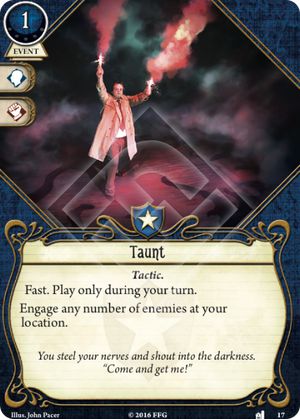What is action compression, what is action investment? Why is this card so damn good?
For 1 resource (something you almost always start your turn with one of) you get at least one engage action with this card. This is the lowest value you get for this card and honestly even at that level it is deceptively good.
Here's the thing: not all actions are made the same. Say you have an enemy engaged with your fragile Daisy flower one stop over from you, if the enemy has 2 health and you have a .45 then it takes you three actions to move, engage and kill that enemy no problem. However if the enemy has 3-4 health you're now in trouble. If there are two enemies at 1-2 health you are similarly guaranteed someone has to take damage (unless your daisy has a plan)
With Taunt you now have that action you need to cut through the chaff and save everyone. Wonderful! For 1 banked resource you saved someone 1 damage and 1 horror probably.
Where Taunt breaks the game is if you're a certain nutty chef. As Zoey you can:
- run into the room
- wave your cross at a horde of rats
- cap one 2 health enemy with your .45
- hack another 2 health enemy with your machete
And make 2 damn resources for your slaughter.
Does it usually get that efficient? No, but since it's minimal efficiency is trading one resource into an action (which is a good trade) it's never a bad card. As soon as there's two enemies in a location fire away and reap the rewards of action economy!
